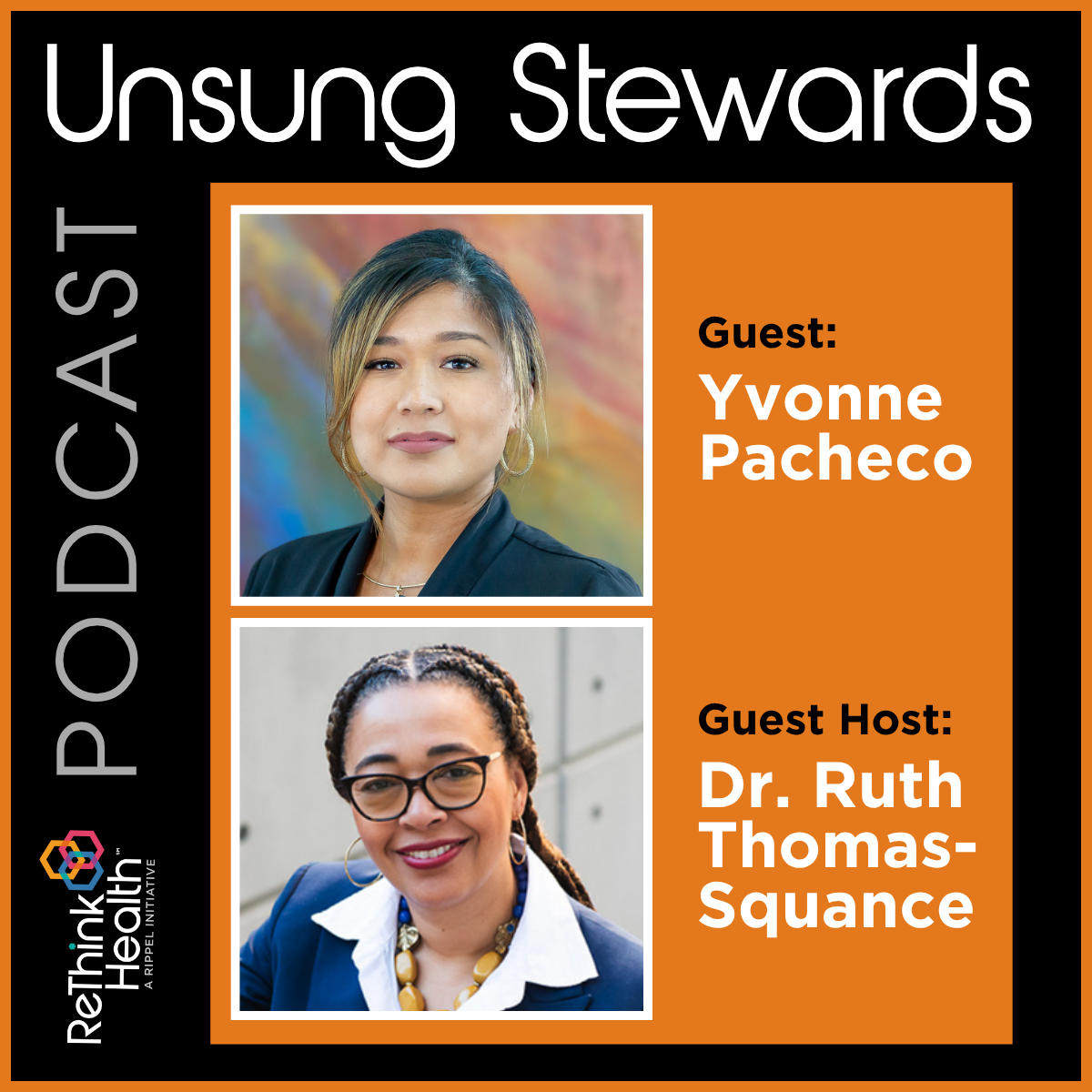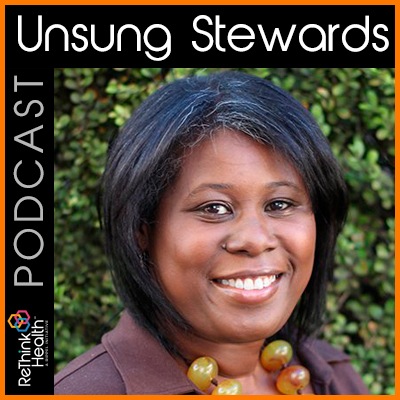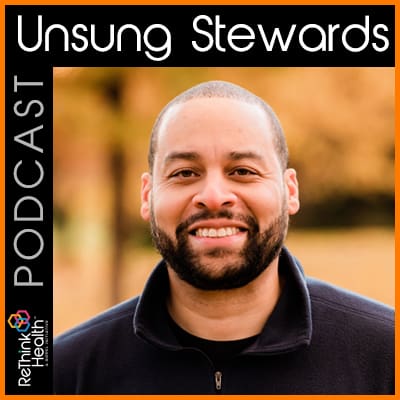Episode Transcript
Speaker 1 00:00:02 In 2020 Foresight, an initiative of the Ripple Foundation set out to hear from thousands of people across the country about how they envision a more sustainable and equitable future and to begin to chart pathways toward achieving that. I'm your host, Katie Evans and in this series of the Unsung Stewards podcast, we talk with people who are doing the hard work of imagining and building a new future. In this moment at Ripple, we call these people stewards. Stewards are people or organizations who take responsibility for working with others to create conditions that all people need to thrive. Today I am so excited to welcome Maka Ura Paki, who is an artist, climate activist and storyteller based in Alaska. Welcome Maka.
Speaker 0 00:00:53 Thank you Katie. I'm glad to be here today. I grew up in Y, it's a small coast of village and it's a village that my ancestors have lived for over a thousand years. We migrated down the Cooper River here in Alaska and did settle in. It's such a beautiful place because it's a place where you can go to places where your ancestors gathered strawberries or blueberries or or spruce roots to weave baskets or hats. It's a place where I can go to where a battle is fought to protect our people from slavery. It's a place where you can go meditate with eagles and I was raised by my mother and my maternal grandparents and that upbringing through the three of them I think was something that is quite normal to fling it culture. You're often raised by your grandparents and aunts and uncles and the entire community.
Speaker 0 00:01:57 Those formative years of what it was to be a modern ling it person set the foundation of who I would be and what I would do with my life and in my education journey, in my, in my career path and the work that I do for community. And I think we always refining a way to survive as an indigenous person with some of the political or socio-economical obstacles against us and find ways to thrive and not just survive, which many of our people have been for so long. So I graduated and I got my bachelor's of science at Northern Arizona University and that was focused on indigenous studies and indigenous nation building. I came back and began my masters of public health from the University of Alaska Anchorage. And so that was actually focused on suicide prevention among indigenous populations with a focus on resilience.
Speaker 0 00:02:58 So not necessarily deficit, why are we thriving? What has helped us survive through the things that challenge us? And of last year I began working for a nonprofit here in Alaska called Native Movement. It's absolutely incredible organization that focuses on indigenous rights in their realms of environmental justice and climate justice, gender justice and healing training, decolonizing, untangling colonialism. I work as a staff member there working specifically on the high rates of Alaska native woman girls and echo missing through homicide. When I'm not doing that work, I practice fling form art where I design jewelry from traditional indigenous materials.
Speaker 2 00:03:51 I know you've been doing this work on data for indigenous justice and on the crisis of missing and murdered indigenous women. I'm just curious if you can speak more about that work and what it looks like.
Speaker 0 00:04:04 It's an Alaska native and woman led nonprofit that currently stewards a database for missing and murdered indigenous women, girls and relatives in Alaska. There is a high rate of native women that go missing and murdered within the United States. It's not just Alaska and the data had a lot of gaps in it. Sometimes when a indigenous woman is murdered, the system here marks it as a suicide. Sometimes when we're murdered, we're not marked as indigenous to understand what is the high rate that this is happening to us. And those data gaps were unacceptable in that being able to have that accurate data and reporting was essential to bring justice to our community. Just last year there was a report released, um, from Data for Indigenous Justice. Um, 5,712 cases of MMI WG were reported in 16. Outta those only one and 16 were logged into the Department of Justice database for the United States.
Speaker 0 00:05:14 Um, Alaska ranks fourth in the nation with the highest cases. And here where I live in Anchorage, it's the third highest cases of all cities across the United States and we are of, we're a city of 500,000 people and we are murdered at 10 times higher than the national average than any other demographic. So this is real work and this work was really formed to build the gaps in the absent data. We wanted to conduct research that's reflective of, of what's really accurate in these communities and to have our own sovereignty over the way this data is used, but we can work to create systems of safety to eradicate this as a real issue.
Speaker 2 00:06:01 So a lot of the work that Ripple has been doing and the way that we met each other Maka, is through the Foresight Initiative, which was an effort to equitably envision and bring about a new future for health and wellbeing. I'm curious, as you look to the future and as you think about the work that you're doing, what sorts of trends or opportunities you see on the horizon as you look at the future of health and wellbeing?
Speaker 0 00:06:28 I think some of the best solutions come from asserting and recognizing indigenous sovereignty within our own peoples. Each of our niches is so distinct and different from each other, and colonization has created this belief that we're kinda on this mass group of people that all have the exact same belief systems and that one thing that works from when one of our communities will work for all of them, but that's not necessarily the case. And our stories are often erased. There's this community that didn't have access to water flint, so there's a lot of media around Flint not having access to, to clean water while an Alaska, that's been the case for many of our coast villages and it still is. They don't have access to clean water. Navajo Nation doesn't have access to clean water in many, in many areas or didn't have a good response system for Covid.
Speaker 0 00:07:22 And so there was friends of mine raised a lot of money to be able to get masks and and water and food out to these locked in villages and communities. So I think it's being able to meet indigenous people where they're at with open arms to understand like what are the best place based solutions that recognize and acknowledge your sovereignty and the needs of your people within your health systems. For example, right now in Alaska just herring season, it's when the herring spawn all throughout the coasts of Alaska and commercial fishing largely by non-indigenous commercial fishermen, has wiped out the schools of herring that would come through my village. So our friends over at Herring protectors are advocating for indigenous food sovereignty systems to be prioritized as we have managed the herring season for centuries. But we're often deprioritized because there are decision makers here that would rather have indigenous people go hungry rather than see less dollars come out of the commercial fishing fleets.
Speaker 2 00:08:36 I'm curious if you can speak to what you see as the intersection, how the places that we inhabit become a kinda health system for us.
Speaker 0 00:08:46 I think in a lot of Alaska native communities to understand the environmental context of a place, just to understand the core of how indigenous people have a relationship to everything around them. In my village, for example, salmon was our main diet growing up, it was always like a joke with my mom. I'd come be like, oh, what's for dinner? I bet it's salmon because most of the time it was to bring in food like beef or chicken or anything to the village is is pretty expensive. And so we lived off the land more so and so every year it's just, it's been changing in yata it used to be like a salmon capital along the Ctec River and it's changing now. Maybe temperature difference or ocean acidification. But any time that I check back in with the people that back at home, they're like, it's, it's hard.
Speaker 0 00:09:43 We have to move away because we can't feed our families anymore. They can't provide for their families and Southeast Alaska, I think that's something you see in a lot of communities and it can look different in different parts of the state. For example, to the far north our, our Inuits and Athabascan relatives are fighting opening up anmar for oil trailing because oil is up in the north. It's a scary resource that they've constantly been fighting since the 1970s when the Alaska Native Claims Settlement Act was created just so that the United States could get access to the oil and they knew that indigenous people were kind of living there and they're kind of in the way. So how do we, how do we figure out a way around this to Bristol Bay? So if we're going over to Western Alaska on the coast, um, that's the place where we've been fighting a pebble mine since I was a teenager.
Speaker 0 00:10:41 There's photos of me dorky 15 year old with my no pebble mine sign in, in Washington DC where I flew to advocate as a youth that recognized that these environments are, it is absolute most important thing for our people to thrive and survive. It's our teacher, it's our home. It's where we have access to the language and understanding who we are. And so while the threats to our communities and may look different from each region to each region, our burning hearts to do this work is the same and we lean on each other. There are a lot of really incredible indigenous groups doing incredible work. So you reach out to ask, how can I help? That's like native movement, native people's action here in Alaska nationally, there's the indigenous environmental network. There's the missing and murdered indigenous woman in Girls usa. And so I think it's like being open to reach out and not only in November Native American Heritage Month, you wouldn't believe how much my DMS or my email in box blows up cuz the organization wants to like, like do one thing with us in November, blast it across our socials and then we never hear from them again.
Speaker 0 00:11:59 It's an ongoing relationship and partnership to help raise what does equity look like for these different communities of color. That's gonna be a lot different for, for black or African American populations here. It's gonna be a lot different for Asian American populations here in the United States or um, Pacific Islanders. All the different groups of people where we need to look at equitable solutions that are placed based that honor cultural differences. And that I think comes back to some of the native movement answers of just and sustainable communities for all it's, it's for everyone and it includes people that are not people of color because we want everyone to thrive. A state of survivals not sustainable for any of us or our families.
Speaker 2 00:12:48 I would love you to moment go back to the beginning of our conversation about the place that you come from, the village you come from and the people you come from and how you think that's influencing the work that you do.
Speaker 0 00:13:04 My mom had this old red table. We moved from place to place with it. She still has it. It's actually in the next room. She has, she has a bedroom here with her stuff. We stained at ra. It was very crooky. If he leaned too much someone in the foldouts, it would collapse and we'd have dinner on it. Growing up she would always make extra and she would tell me to call my grandfather. And so I'd call him, say it's dinner time, come over and I'd hang up and he'd like show up 10 minutes later. And that was the unspoken invite for us to just hear from him, to hear his stories. And so we would eat and then he would clear the plates and you'd just sit back down in the cup of tea just in silence until he would start talking. He talked a lot about howling, get train in the water and he would talk about how his uncle would get him up.
Speaker 0 00:13:55 Are people trained in the ocean? It was to strengthen our mental and physical health. The cold water training is to make us very resilient to the intense environment and season that we have here. But it's also so much more of the mental cause You have to train yourself to stay there in the water. And I always come back to his stories cause there's always answers. Answers always come in the stories and they come from our oral histories as well. Even like our stories about how the world was created. How are Raven brought the sun and stars and Moon to the world. It's one of our oldest stories and it surrounds the thought process that everyone should have access to the, everyone should have access to the to to survive. And so the, I think those are the things that lead me always back to this work.
Speaker 0 00:14:56 Even when it gets really hard, even when we wanna break down in in tears because every time politicians make a decision on legislation where they don't want to support the work we're doing to us, that's them saying, we don't acknowledge your humanity. We don't think indigenous women should be safe or, or protected. Those are really hard things that we often come across. And so when I come back to the stories, I tell myself, I'm in the water. I'm challenging myself because if I don't, resilience will not be embedded in my DNA and in my cells and my descendants deserve that.
Speaker 2 00:15:40 Maka Paki is an artist, scholar, storyteller, and activist working towards the revitalization and preservation of indigenous culture. Thank you, Maka.
Speaker 0 00:15:49 Thank you Katie And the team.
Speaker 1 00:15:52 The Unsung Stewards podcast would not be possible without the talents of Maggie Cook. Molly Besky, Terry Wade, Brad Gerard, Rachel Gotbaum, and Amanda McIntosh. Deep gratitude to the thousands of people who shared their hopes and aspirations for the future through foresight, an initiative of the Ripple Foundation, and particular thanks to our guests. I'm your host, Katie Evans from the Ripple Foundation, and you are listening to unsung Stewards.


